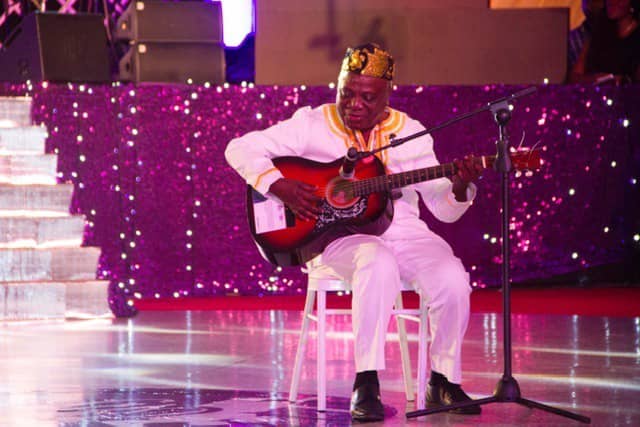Nana Kwame Ampadu was a Ghanaian musician and composer with over 800 popular highlife tracks to his credit.
His music is typically of Ghanaian indigenous language, where he used tales, riddles, and fable stories as well as Ghanaian instruments in the composition of songs.
His songs are thought-provoking and speak to issues of life such as jealousy, love, hatred, greed, over-ambition, etc. He is a great storyteller and most of his songs are advice to the masses.
Ampadu was the lead singer, chief songwriter, and founder of the “African Brothers Band”. He is regarded as a pioneer of highlife music and one of the most illustrious Ghanaian musicians of the 20th century.
The African Brothers Band was formed in 1963. One of the founding members was Eddie Donkor.
The name was in support of the call by Kwame Nkrumah for African unity. The group was later renamed the African Brothers International Band in 1973.
Ampadu came to prominence in 1967 when he released his song Ebi Te Yie (or “Some Are Well Seated”), a song that was seen as potentially critical of the then-governing National Liberation Council and disappeared from the airwaves, only returning after the end of military rule.
His musical career also involved him in electoral politics, including composing a song for Jerry Rawlings’s National Democratic Congress party to use in the 1992 election campaign.
Ampadu also released a song critical of an attempt to disqualify Rawlings from the 1992 election based on him being half-Scottish.
The Ebi Te Yie singer toured with the S. K. Oppong Drama Group, which performed concerts and short plays on the programmes of his band. This group later evolved to become the cast of Osofo Dadzie, the most popular Ghana TV drama series for many years.
One of his songs, Obra, became the theme song for Obra, another very popular Ghanaian TV drama series.
He also wrote the theme song for the national Operation Feed Yourself programme of the military National Redemption Council for national food sufficiency.
Some of his songs are Mede Aseda, Obra Twa Owuo, Mene Wo Beye I, Obia Ba Nye, Kwabena Amoa, Mene Wo Beye II, Ne No Nsan Whe, Anomaa Tewaa, Menkoaa Dee Na Aden, Mene Wo Beye, Pt. 1, Mene Wo Beye, Pt. 2, Yeewe Nsa A Wose Shirt, Meye Agyenkwa, Obi Benya WoObra, Ofie Nwansena, etc.
Mostly played at funerals, cultural festivals, and occasionally celebrations, Nana Ampadu’s songs provide solace and inspiration to people depending on their surroundings or situation.
In 1973, he won a nationwide competition in Ghana and was crowned the “Ndwontofoohene,” (King of Singers).
Ampadu was born on 31 March 1945 to Opanying Kwame Ampadu and Mercy Afua Ntiriwaa, both of Obo Kwahu in the Eastern Region of Ghana.
The legendary singer died on 28 September 2021, at the age of 76, at the Legon Hospital in Accra.
The burial and final funeral rites were held in his home town Obo Kwahu in the Eastern Region.
President Nana Addo Dankwa Akufo-Addo was present at the funeral ceremony including the Speaker of Parliament, Alban Bagbin, and the Minister of Interior, Ambrose Dery, and other dignitaries.
In his active playing years, Nana Ampadu and his band traveled several times to the United Kingdom, United States, Canada, France, Belgium, Holland, and across Africa to perform.
Like an expert, several ‘students’ passed through his hands and became band leaders on their own. They included Sam Derchie, Teacher Boateng, Oppong Kyekyeku, Nanaba Amoako, Senior Eddie Donkor, and Prince Osei Kofi.
Apart from helping the men to perfect their skills, Nana Ampadu also groomed and produced albums in the mid-to-late 1980s for female singers like Mum B, Akosua Agyapong, Abena Nyanteh, Ama Oforiwah, Rita Owusu and Stella Tackie.
The Ndwontofoohene (King of Singers) no doubt contributed to the growth of the Ghana Music Industry and will forever be remembered.
